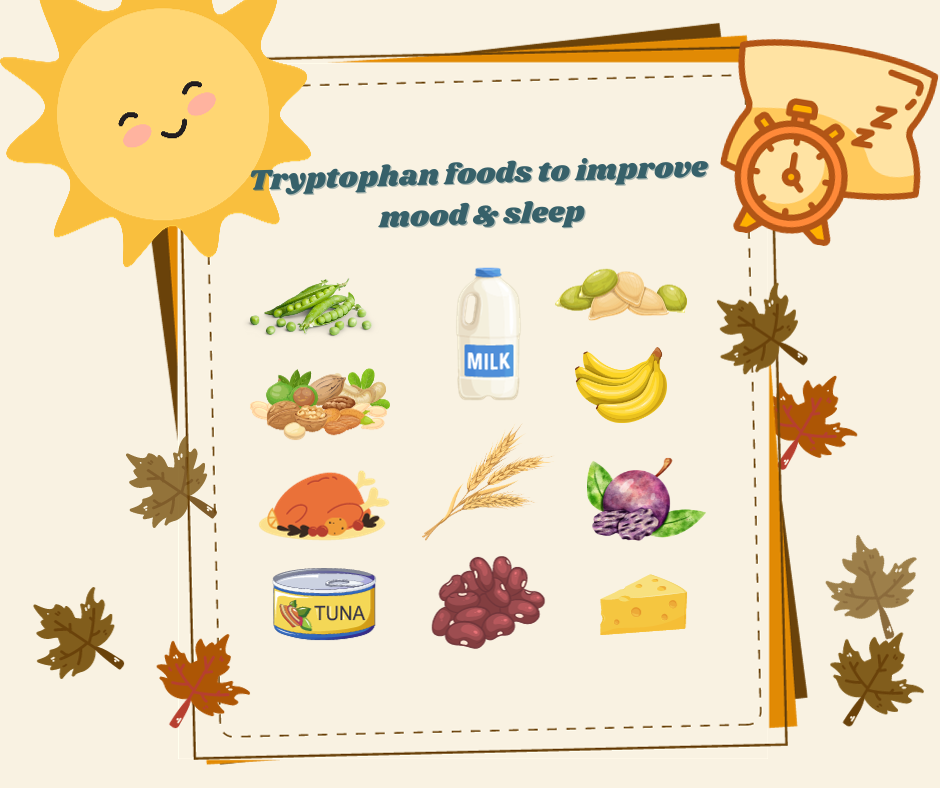Thanksgiving is right around the corner. That means turkey and all the fixings. Do you ever wonder why you get so tired after a turkey dinner? It’s not just the family drama, or the overeating, it’s also partially due to tryptophan.
Tryptophan is an amino acid. It’s also the precursor to the neurotransmitters serotonin and melatonin, which are directly linked to mood and sleep-wake cycles.1 Serotonin is thought of as the “feel good” neurotransmitter. It’s most commonly linked to depression and anxiety. Serotonin is also responsible for the regulation of sleep and appetite.
Tryptophan requires transporters in order to cross the blood brain barrier to create serotonin. Other amino acids also utilize these same transporters to cross the blood brain barrier. A few of these are branch chain amino acids, which means the presence of BCAA in the diet can reduce the amount of tryptophan that crosses the blood brain barrier and low tryptophan in the blood results in decreased serotonin in the brain.1-2
Melatonin is a hormone derived from serotonin that’s in charge of our circadian rhythms. By consuming a diet rich with tryptophan, more serotonin and thus more melatonin is produced. This can lead to improved sleep quality and reduce the time it takes to fall asleep.2 Consuming tryptophan rich foods a few hours before bed can help improve sleep quality. Ever wonder why warm milk before bed was a thing?
Common sources of tryptophan include poultry, milk, tuna, peanuts, pumpkin seeds, beans, oats, dried prunes, and bananas. In humans, tryptophan has relatively low tissue storage and the overall tryptophan concentration in the body is the lowest among all amino acids.3 Research has found that a high protein diet, one that contains a lot of large neutral amino acids or branch chain amino acids will leave less tryptophan available for serotonin synthesis.2 Therefore, consuming a high carbohydrate diet may correct serotonin insufficiency by changing the amino acid levels to a higher tryptophan to LNAA ratio.2 When carbohydrates are consumed, insulin is released. The release of insulin helps absorb amino acids from the blood; all but tryptophan which stays bound to albumin in the blood. This leaves more tryptophan available to bind onto transporters and travel to the brain for serotonin synthesis.2 Interestingly enough, carbohydrate cravings are common in people with serotonin or tryptophan deficiencies.1
This doesn’t mean go crazy with poor quality carbs. What it does mean is enjoy your Thanksgiving dinner and all of the carby goodness. Sometimes you just need a little tryptophan to feel good.
- Lord R. and BralleyA. J. Laboratory Evaluations for Integrative and Functional Medicine. Metametrix. 2012.
- Halson S.L. Sleep in elite athletes and nutritional interventions to enhance sleep. Sports Med. 2014;44:13–23. doi: 10.1007/s40279-014-0147-0.
- Richard DM, Dawes MA, Mathias CW, Acheson A, Hill-Kapturczak N, Dougherty DM. L-Tryptophan: Basic Metabolic Functions, Behavioral Research and Therapeutic Indications. Int J Tryptophan Res. 2009 Mar 23;2:45-60. doi: 10.4137/ijtr.s2129. PMID: 20651948; PMCID: PMC2908021.

